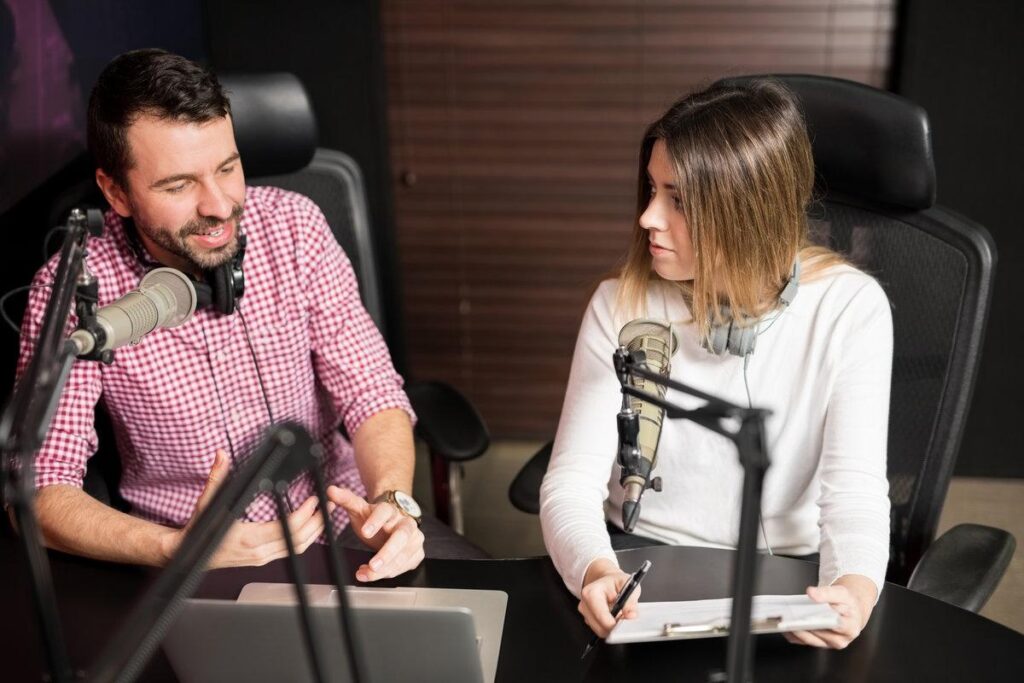Four conversations
Listen to four conversations to practise and improve your listening skills.

Do the preparation task first. Then listen to the audio and do the exercises.
Preparation
See MoreListening A2: Four conversations – preparation
Put the words and phrases in the correct group.
Transcript
See MoreA
Man: How did it go?
Woman: Umm, I think it went quite well. I did a lot of research and prepared a lot. I was in there for … I don’t know … half an hour?
Man: And? What did they say?
Woman: Nothing much. At the end I asked them, ‘What happens now?’, and the woman said, ‘We’ll call you back with news in three or four days.’
Man: Really?
Woman: Yeah, I think I’ve got the job. There weren’t a lot of other people there. I was the only interview that day, you know?
Man: Well, good luck with it.
B
Man: Anyway, you were saying …
Woman: Oh, yeah, um … let’s see. Yes, so I was in the museum and there were, I don’t know, a hundred people waiting to get into the room. Finally, I got in, and I tried to see the Mona Lisa but I couldn’t look at it.
Man: Why not?
Woman: Because the room was filled with people taking photographs of it!
Man: Oh, right.
Woman: Yes! And selfies.
Man: Wait a minute. You can take photos while you’re in there?
Woman: Yes, but you can’t use flash. I don’t know … Why do we take photos of everything we see when we travel?
Man: I know. And we never look at the photos after.
Woman: Exactly! I’m tired of always taking photos. I don’t feel I’m enjoying things.
C
Man: Who took this?
Woman: I can’t remember. Hmmm …
Man: What am I doing?
Woman: You’re sitting on the sofa, watching TV and eating chocolates. Nothing changes!
Man: Ha! Very funny. You look very young, though.
Woman: I know. Look at my hair – it was so long!
Man: Mine too, look at me! Hey … I think I know who took this photo.
Woman: Umm … who? Was it Dad?
Man: No, it wasn’t Dad or Mum. Do you remember Barry?
Woman: No.
Man: Yes, YES! You do remember. Barry, your boyfriend at high school. You were seventeen and he was sixteen and he was so very polite: ‘Hello, I’m Barry. It’s very nice to meet you …’
Woman: Stop it! He was nice.
Man: Yeah, well, he took the photo.
D
Woman: Let’s see. OK. I’m glad we could talk about this. It’s not easy to say.
Man: What?
Woman: Well, you’re not in our group – for the class project.
Man: What do you mean? You know I’m always in a group with you.
Woman: I know. It’s just that this time … this time we made the group differently and because you were late …
Man: I see. You don’t want me in the group?
Woman: No, no. It isn’t that. It’s that we’ve already made the group, see? There’s four of us already.
Man: So? We can’t be a group of five?
Woman: Well, the teacher said four people per group.
Man: Oh.
Woman: It’s not about you or your work or anything like that. It’s … errrr … well, we already have the group.
Man: So I have to find another group.
Woman: I’m sorry.
Task 1
See MoreListening A2: Four conversations – 1
Match the topics with each conversation.
Task 2
See MoreMeeting other students

Listen to a group of new students meeting for the first time to practise and improve your listening skills.
Do the preparation task first. Then listen to the audio and do the exercises.
Transcript
See MoreTeacher: So, now you’ve got the important information, it’s time to meet each other. Everyone turn to the people next to you and introduce yourselves.
Cara: So, hi. I’m Cara. And you are?
Robert: Robert.
Selim: Selim.
Cara: Nice to meet you!
Robert and Selim: You too.
Robert: Nice accent. Where are you from?
Cara: I’m from Glasgow.
Robert: Oh, really? My mum’s from near Glasgow, so I’m half Scottish.
Cara: Cool. Do you live in Scotland?
Robert: No, we live in England, near Manchester. My dad’s from there. What about you, Selim?
Selim: I’m from Leeds originally but I grew up near London.
Cara: Are you both doing history on its own?
Selim: No. I’m doing history and German.
Robert: I’m doing it with maths, actually.
Selim: History and maths. That’s different!
Robert: Yeah, I couldn’t decide between arts and sciences. Maths doesn’t help with remembering dates, though! And you?
Cara: I’m doing history and French.
Selim: I wanted to do French but German was easier, so I took that.
Cara: German is so hard!
Task 1
See MoreListening A1: Meeting other students – 1
Put the phrases in the correct group.
Task 2
See MoreListening A1: Meeting other students – 2
Put the sentences in the correct order.
Meeting a new team member

Listen to a conversation between two new colleagues to practise your listening skills.
Do the preparation task first. Then listen to the audio and do the exercises.
Preparation
See moreListening A1: Meeting a new team member – preparation
Transcript
See morePeter: Hi, my name’s Peter. What’s your name?
Carla: Hi, Peter. I’m Carla. I’m new here.
Peter: Welcome to the company, Carla.
Carla: Thanks, Peter. I’m happy to be here and it’s nice to meet you.
Peter: It’s nice to meet you too.
Carla: Where do you work?
Peter: I work in the design team. We sit over there.
Carla: I’m in the marketing team. I started last week.
Peter: You work in marketing? That’s very interesting.
Carla: Yes, it is. I’m enjoying it. But there are a lot of new things to learn.
Peter: I’m sure there are. I’m happy to help you if I can.
Carla: Thank you, Peter. What do you do in the design department?
Peter: I design new products.
Carla: That sounds interesting. I plan marketing events for new products. So I think we’ll work together sometimes.
Peter: That would be great. So, where are you from, Carla?
Carla: Brazil. And you?
Peter: I’m from the UK.
Carla: How long have you been here?
Peter: I’ve worked here for three years but I actually moved here from the UK five years ago, to study.
Task 1
See moreListening A1: Meeting a new team member – 1
Are the sentences true or false?
Task 2
See moreListening A1: Meeting a new team member – 2
Match the sentences with who said them.
An interview about two books
Listen to an interview about two books to practise and improve your listening skills.

Listen to an interview about two books to practise and improve your listening skills.
Do the preparation task first. Then listen to the audio and do the exercises.
Preparation
See MoreTranscript
See MorePresenter: Today we’re looking at the darker side of literature with two books about not-so-happy families. And we’ve got writer Helen Slade and book critic Anna Kimura to talk us through them. First up, we’re looking at Her Mother’s Daughter by Alice Fitzgerald, a novel written from two points of view, one of a child and the other of her very troubled mother. Helen, I have to be honest. I found this one hard to read. It’s very well written but, well, how did you find it?
Helen: I know what you mean, but I literally couldn’t put it down and stayed up till three in the morning to finish it. There’s something about immersing yourself in a family this flawed, this damaged, that’s compelling. You’d never want to be in that family yourself, but that’s what reading is about, isn’t it? Wearing someone else’s shoes for a while without ever having to live their reality.
Presenter: You surprise me! The families in your own books are a million miles away from this one.
Helen: Yeah, my readers can always be sure they’re going to get a happy ending. Which you definitely … I don’t want to give too much away here, but you definitely don’t feel like a happy ending is coming for these characters.
Presenter: OK, so don’t mention the ending, but can you just describe for listeners what the book is about?
Helen: So, it’s about a family with secrets. The mother has hidden her troubled childhood from her husband and her two children but, of course, it’s shaped her entire personality and how she behaves as a mother and as a wife. Which is especially obvious when we’re reading the sections told in the child’s voice, even though the little girl herself doesn’t understand the meaning of everything she’s seeing.
Presenter: For me, what was really so shocking was less what happened to the mother when she was a child but how the mother treated her own children. Why is that, do you think?
Helen: I think we’re all programmed to see mothers as something sacred and pure. As a child she was mistreated by her father, and in some ways we’re not that shocked by that, which is a sad thing in itself, and her own mother didn’t help her. As a reader we’re less affected by that, I think, because that part of the story is revealed to us in the mother’s voice, the adult voice. But the reason the way she treats her own child is so much more shocking is that the child is telling us about it and we sympathise with her. It’s very clever how the author plays on our natural instincts to protect a child.
Presenter: Though we do feel sorry for the mother too. Or, at least, I did.
Helen: It’s hard not to. She’s trapped in her own unhappiness.
Presenter: And we’re trapped right there with her as the reader. It made me wonder, Anna, why is it that miserable books like this one sell so well?
Anna: Because all of us have families. I suppose the books play out things we all see in much smaller ways in our own family lives.
Presenter: The other hard-hitting book this week is We Need to Talk About Kevin by Lionel Shriver. Now there’s a family who have a problem!
Anna: They definitely do. Very few people will ever have a killer as a teenage son like the narrator in the book, but we can all identify with the challenges and often terrifying reality of raising teenagers!
Presenter: So can you give us the lowdown on Kevin, then, Anna?
Anna: This book is written from the point of view of the mother in letters she’s writing to her husband, Kevin’s father. Again, we shouldn’t say too much about the ending, but the way the author uses the letters is very clever.
Presenter: I have to admit, I really enjoyed this book. It’s a difficult topic, but it was much easier to read than Her Mother’s Daughter.
Anna: As Helen said before, it’s about the voice of the narrator. There’s no child’s voice and, in this story, the victims in many ways are the adults, though, of course, Kevin’s sister is a victim of her brother’s evil.
Helen: Yes, and the idea of where ‘evil’ comes from is a theme that comes out in both books. If you choose to call it ‘evil’ that is. I prefer to describe it as a complete lack of empathy. The mother in Her Mother’s Daughter had a terrible childhood, but Kevin’s from a happy home and good parents.
Presenter: Is he though? The mother often admits she found motherhood hard. Aren’t we supposed to think she might have caused Kevin to turn out the way he does? Just like in Her Mother’s Daughter.
Anna: Both books certainly look at how the mistakes of the parents affect children. And this is another reason we relate to these books. Parents are always worrying if they’re doing a good job.
Task 1
See MoreTask 2
See MoreListening C1: An interview about two books – 2
Choose the correct answer.
Film reviews

Listen to the film reviews to practise and improve your listening skills.
Do the preparation task first. Then listen to the audio and do the exercises.
Preparation
See MoreTranscript
See MoreObviously, this is the sequel to Fun in the City, which is a film I didn’t like so it’s fair to say my expectations were low. So, you could say I wasn’t disappointed, as it met my expectations. It was awful! It was so awful, I’d rather not spend any more time on it by talking about it. But, that wouldn’t be a film review and I think I owe you all a review to save you wasting your money going to see it.
So, it starts off with this big wedding scene. And, I won’t go into why, but the whole scene is just there so they can make this one joke. It’s not even a funny joke … it’s just, ah, it’s just terrible. It’s got nothing to do with the rest of the film. Anyway, it starts there. Then, instead of the characters and the plot staying in New York where the original film was set, one of them wins a ticket to India and decides to take all her friends. It’s what directors do when they’ve run out of ideas … let’s take our characters on tour!
Anyway, they gossip, cry and shop, and they repeat this until the end. No real people would ever act like this. I didn’t have any sympathy for their problems or even care what happened to them. Don’t go and see it, you’ll only encourage them to make another sequel. The world doesn’t need three of these films. Please save your money and go and see the other big film this week: Twilight Mirror.
So, if you’re a fan of the book it’s based on, you’re probably as excited as I was about this. For everyone else, this is a film fans have been waiting ten years to see. I have to confess, I was a bit nervous. I’d seen the posters and they didn’t look right. I didn’t love them at all. And I wasn’t sure about the actors they cast either. So I went in not sure what to expect. But … I loved it.
One thing I really liked about it was the pace. They went backwards and forwards between the real world and the computer world and it worked really well. The special effects brought the computer world to life and I totally believed in it. But, more than that, I felt emotionally connected to the story and the characters. The whole film worked on so many levels. It reminded me of going to the cinema as a child – how much fun that was. I can’t recommend it enough.
Task 1
See MoreTask 2
See MoreArriving late to class
Listen to the conversation between two students to practise and improve your listening skills.
Do the preparation task first. Then listen to the audio and do the exercises.

Preparation
See moreTranscript
See moreStudent 1: Sorry. Sorry, excuse me. I’m just … just coming to sit over here. Phew. Hey. How’s it going? So, what have I missed?
Student 2: Nothing. He just started around five minutes ago.
Student 1: Did he say anything about the mid-term?
Student 2: What?
Student 1: About the mid-term tests. Did he say anything about when he was going to hand them back?
Student 2: He’s almost finished marking them, he said. We get them next Tuesday.
Student 1: I’m sorry, I didn’t catch that. When do we get them?
Student 2: Tuesday. Next Tuesday.
Student 1: OK. Got it. Sorry. What page are we meant to be on?
Student 2: Page 34.
Student 1: Page … 34. Oh, wait. I don’t have my textbook. Can I … share with you? Wow. This is hard stuff.
Student 2: Mmm.
Student 1: What does SEO mean?
Student 2: What?
Student 1: SEO. This is all about SEO but he hasn’t said what it means.
Student 2: Search engine optimisation. How to appear on internet searches.
Student 1: Internet searches. Right. Right. OK.
Student 2: He said what it meant.
Student 1: What?
Student 2: He explained it before you got here.
Student 1: Oh. Right. OK.
Student 2: Can you be quiet? I’m trying to listen to the lecture.
Student 1: So am I. Sorry. Sorry, one more question. What does this have to do with the American Revolution?
Student 2: What?
Student 1: I don’t get it. Why is he talking about search engines in a course on the American Revolution?
Student 2: What are you talking about? This is a class on software engineering.
Student 1: You mean, it’s not Early American History?
Student 2: You’re in the wrong class.
Student 1: Oh, wow. Now it all makes sense. I’m so sorry.
Student 2: It’s fine.
Student 1: Here, I’ll just … excuse me. I’m in the wrong class. Excuse me. Thanks. Sorry.
Comentarios recientes